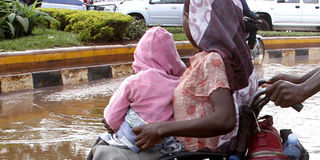Disability: A rising issue among HIV positive people

Persons with disabilities require information on HIV and access to programmes, services, and resources. NET PHOTO
Priscilla was born with HIV, but no one knew until she was eight years old. Due to late diagnosis she suffered hearing loss. Her mother passed away due to some complications when Priscilla was five and her father lives in the United States, so she lives with her grandparents. In 2006, she became ill, so her grandparents took her to a doctor who tested her for HIV.
“The shame that the discovery brought me caused me to lose interest in life,” she shares, “Nonetheless, I am thankful that my family members would take me to the clinic to get ARVs and help me navigate clinics until I was old enough to go by myself.”
Today Priscilla visits Alive Medical Services (AMS) every week to pick her prescription and interact with her counsellor and friends though her primary form of communication with her doctor is writing. While she tries to speak to the people at the medical centre, she is often misunderstood because her voice sounds distorted.
Priscilla lives a normal life but refuses to talk about any stigma she has faced because it makes her emotional. Thankfully, her family is supportive and trusts her to make her own decisions.
No more help
Programmes and resources exclusive to physically challenged HIV positive people are non-existent despite recent advocacy efforts. According to Dr Carol Nakazzi, a consultant with Uganda AIDS Commission, there were programmes specific to these communities before, but global recession curtailed them. She adds that there is a need for these programmes because people who are physically challenged are treated the same as regular patients. While several Disabled Persons Organisations (DPO) and Non-Governmental Organisations (NGO) offer advocacy and training for interpreters, there is lack of funding for programmes.
Dr Daniel Byamukama, the head of prevention for the Uganda AIDS Commission oversees a budget that is dedicated to groups with the highest HIV prevalence rates, and regularly receives requests by deaf and blind people for funding for programmes and services specific to their communities. However, he says that deaf and blind people have a less than one per cent prevalence rate.
Byamukama adds that while there have been pilot programmes and organisations focused on accommodating for deaf and blind people, no long-term programme has been implemented.
HIV induced ailments
According to Dr Emmanuel Luyirika, executive director of the African Palliative Care Association, some disabilities result from HIV complications and opportunistic infections. The most common infection is tuberculosis which affects the spine and can cause paralysis. Other infections can cause blindness, nerve damage, neurological complications, and toxoplasmosis which infects the brain and causes stroke-like symptoms.
Double stigma
People who are deaf, blind, or physically challenged yet HIV-positive face double stigma not only from their communities but also within their families. Dr Luyirika says that stigma stems from their disability because they are viewed as a curse in most families.
While some disabilities are caused by AIDS, Dr Nakazzi also points out that disabled people are also susceptible to contracting HIV because of communication issues. For example, the likelihood of rape or sexual assault increase due to miscommunication. Stigma within families also plays a significant role in whether or not patients seek medical care as many go to great lengths to conceal their status from neighbours.
People Living with HIV are often shunned, disowned, or even murdered because they are infected, according to Dr Stephen Watiti, senior medical officer at Mildmay Health Centre. Watiti is HIV positive and can relate to his patients with particular empathy because he has seen first-hand the double stigma that patients; from families and communities suffer. For example, he said, disabled people are not expected to have sex, so when they see a pregnant woman that is limping and deaf yet living with HIV, they ask, “How did you do this? You mean you could not see that you had a problem already?”
Watiti explains that the disabled are normal people with sexual feelings and need to feel loved, “stigmatising them is torture; first of all, being HIV positive is stigmatised enough and having a disability is looked at as an extra disadvantage.”
While HIV-positive persons without disabilities also face some of this stigma, it is amplified for persons with disabilities. These overlapping stigmas are the major underlying reason for late HIV diagnosis, sub-optimal attendance at health clinics for Anti Retraviral Therapy (ART) services and lack of family and community support.
Help
To help disabled persons living with HIV, schools for the deaf /blind near Kampala are training more people in sign language and brail to help clients communicate when seeking help regarding HIV testing, treatment, and support. While some physically challenged people can board boda-bodas with the help of nurses, there is still a need for wheelchair accessible transportation in the country.
Future prospects
For Priscilla, who is studying to become a kindergarten or high school teacher, she is hopeful that she will be able to afford a hearing aid one day because she misses sound.




